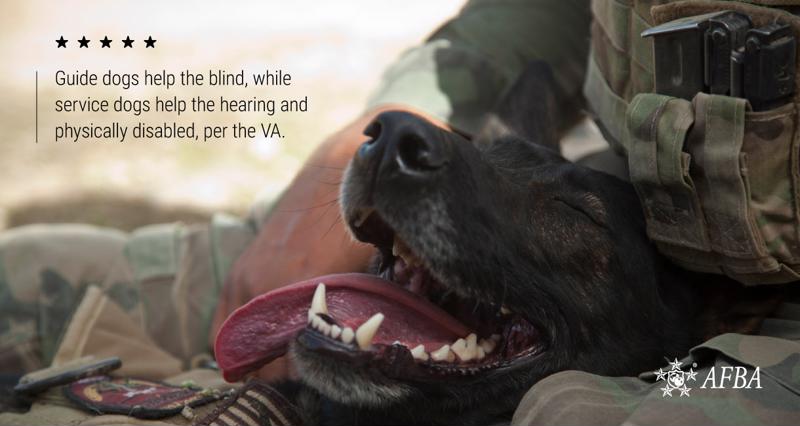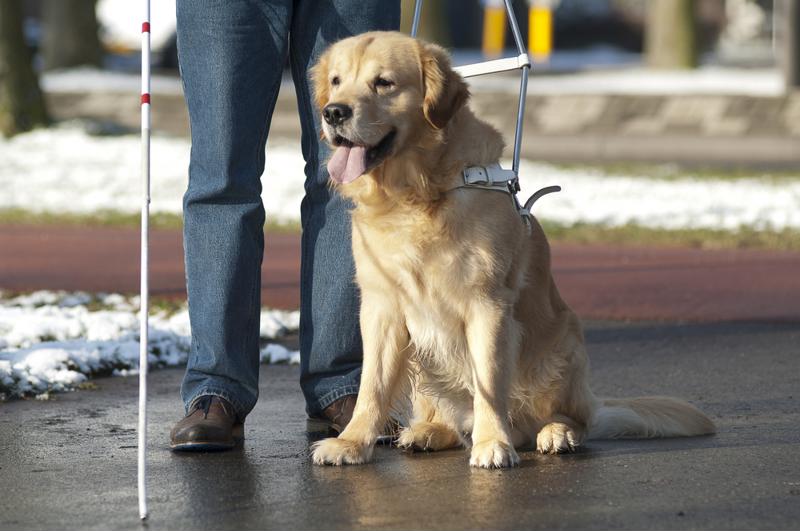Dogs are loyal, intelligent and devoted to their families, so it's no wonder these pets are chosen to help people with physical disabilities and chronic mental health issues. Many veterans use dogs to help them adjust to combat-related ailments. However, getting a service dog and understanding what the VA will cover can be complicated. This guide will help veterans understand how to get their own service animal and what the VA does to support dogs as a mental health treatment.

The VA and service dogs
The VA classifies dogs into two types:
- Guide dogs assist blind veterans.
- Service dogs assist veterans with a physical or severe to profound hearing impairment.
Vets who enroll in VA healthcare may be eligible for either type depending on their condition. That said, the government doesn't provide a dog to everyone who asks. Veterans must demonstrate a medical need, as evaluated by a physician, for a guide or service animal. The process summarized looks like this:
- A vision, hearing or physically impaired veteran talks to their primary care provider, who refers the veteran to a specialist.
- A VA medical team conducts a complete evaluation to see if a dog is the best type of treatment for the veteran.
Additionally, the VA doesn't provide service or guide dogs itself. Rather, it works with accredited non-VA agencies — organizations that specialize in training service animals. Veterans will go through an educational process to learn how to communicate with their service dog, after which the canine will become the veteran's property.
That said, the VA does pay for veterinary care — though not other expenses like food, grooming and boarding — through VA Prosthetics and Sensory Aids.
Service dogs and mental health
Currently, the VA doesn't provide service dog assistance for veterans with post-traumatic stress disorder or other mental health issues. This type of help is offered by independent veterans groups and nonprofits. Advocates are pushing for VA-funded mental health service dogs, and their efforts might pay off in the next few years.
Many individual success stories show the positive effects service dogs have. For example, a study from Purdue University found both current servicemembers and veterans with a trained service dog showed significantly lower signs of PTSD and related symptoms such as social isolation, absenteeism and depression. They also displayed higher signs of psychological well-being like social functioning and quality of life.
However, as the study's author noted in a conversation with The Washington Post, this research is still preliminary. The VA also wants to be certain that service dogs truly help veterans from a mental health perspective. If benefits are clinically proven, the VA wants to create a thoroughly researched checklist of what skills these animals should learn before considering paying for their care.
To that end, the government is currently conducting a $12 million, multi-year study on the benefits of mental health service dogs. Originally, this research drew a lot of criticism. Per The Washington Post, the dogs were provided by contracted groups, and some of the animals bit participants' children. The animal trainers also potentially biased veteran opinions (and thus the outcome of the study) by saying how helpful the dogs could be. The study has since been redesigned to include VA-hired trainers and a control group of veterans with emotional support dogs. The initial results are expected in 2019.
That said, the VA also launched a service dog pilot program limited to 100 veterans, according to Military.com.
"I've seen the impact that these dogs can have on veterans and so I'm a believer," VA Secretary David Shulkin said of the pilot, per Military.com. "I don't want to wait until the research is there. If there's something that can help our veterans, we want to be pursuing it."
If results from the pilot program and study are positive, veterans may be able to receive VA assistance for their service dogs within the next few years.


